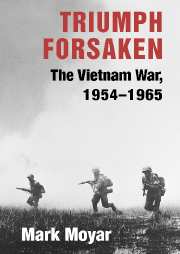Book contents
- Frontmatter
- Contents
- List of Illustrations
- Preface
- Acknowledgments
- Triumph Forsaken
- Southeast Asia
- Map of Indochina
- Map of South Vietnam (Communist)
- Map of South Vietnam (Republic of Vietnam)
- 1 Heritage
- 2 Two Vietnams: July 1954–December 1955
- 3 Peaceful Coexistence: 1956–1959
- 4 Insurgency: 1960
- 5 Commitment: 1961
- 6 Rejuvenation: January–June 1962
- 7 Attack: July–December 1962
- 8 The Battle of Ap Bac: January 1963
- 9 Diem on Trial: February–July 1963
- 10 Betrayal: August 1963
- 11 Self-Destruction: September–November 2, 1963
- 12 The Return of the Twelve Warlords: November 3–December 1963
- 13 Self-Imposed Restrictions: January–July 1964
- 14 Signals: August–October 1964
- 15 Invasion: November–December 1964
- 16 The Prize for Victory: January–May 1965
- 17 Decision: June–July 1965
- Abbreviations Used in Notes
- Notes
- Index
- Plate section
11 - Self-Destruction: September–November 2, 1963
Published online by Cambridge University Press: 05 August 2012
- Frontmatter
- Contents
- List of Illustrations
- Preface
- Acknowledgments
- Triumph Forsaken
- Southeast Asia
- Map of Indochina
- Map of South Vietnam (Communist)
- Map of South Vietnam (Republic of Vietnam)
- 1 Heritage
- 2 Two Vietnams: July 1954–December 1955
- 3 Peaceful Coexistence: 1956–1959
- 4 Insurgency: 1960
- 5 Commitment: 1961
- 6 Rejuvenation: January–June 1962
- 7 Attack: July–December 1962
- 8 The Battle of Ap Bac: January 1963
- 9 Diem on Trial: February–July 1963
- 10 Betrayal: August 1963
- 11 Self-Destruction: September–November 2, 1963
- 12 The Return of the Twelve Warlords: November 3–December 1963
- 13 Self-Imposed Restrictions: January–July 1964
- 14 Signals: August–October 1964
- 15 Invasion: November–December 1964
- 16 The Prize for Victory: January–May 1965
- 17 Decision: June–July 1965
- Abbreviations Used in Notes
- Notes
- Index
- Plate section
Summary
after the insurrection failed to blossom, opinion in the highest ranks of the U. S. government remained divided along lines similar to those before. Harriman, Hilsman, Ball, and Forrestal continued to attack Diem. Relying to a considerable degree on press reports, they argued that mid-level South Vietnamese officers and soldiers were growing weary of the regime's repression of the Buddhist activists. They acknowledged that the counterinsurgency effort had not yet been harmed seriously by morale problems, but predicted that it was going to come apart soon. In their minds, a successful South Vietnamese regime needed to tolerate public protests, conduct fair elections, broaden the government, give numerous public speeches and press conferences, and otherwise conduct itself like an American government. They believed that there existed individuals within South Vietnam who could lead the war against the Communists as well as or better than Diem, though they seldom specified exactly whom they meant. A State Department cable exemplifying this type of thinking read: “Seems clear from our studies that Vietnam has no lack of qualified leadership or executive talent if available personnel resources are put to effective use.”
The list of Washington officials who opposed Diem's removal remained filled with men of greater clout, including Secretary of Defense Robert McNamara, Chairman of the Joint Chiefs of Staff General Maxwell Taylor, Attorney General Robert Kennedy, and CIA Director John McCone, as well as others of past and future significance such as former Ambassador Nolting, CIA Far East Division Director William Colby, and Vice-President Lyndon Johnson.
- Type
- Chapter
- Information
- Triumph ForsakenThe Vietnam War, 1954–1965, pp. 244 - 274Publisher: Cambridge University PressPrint publication year: 2006



